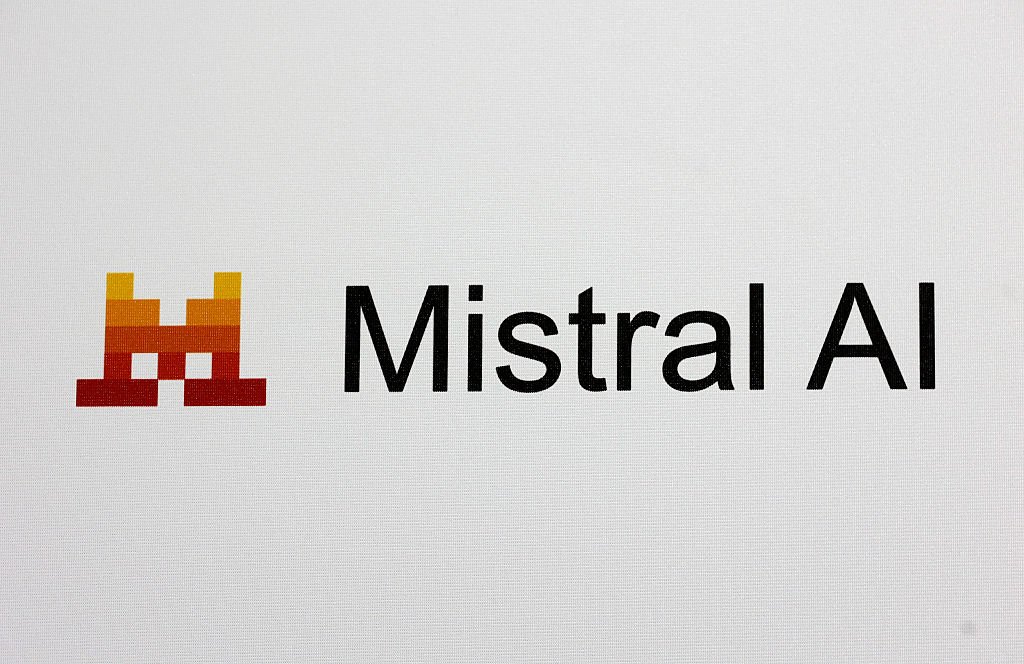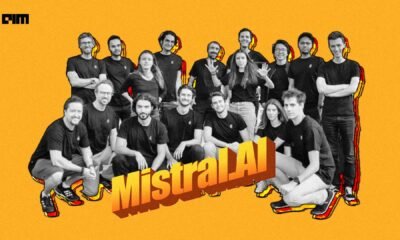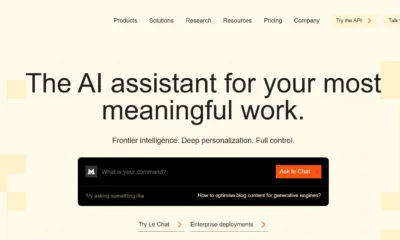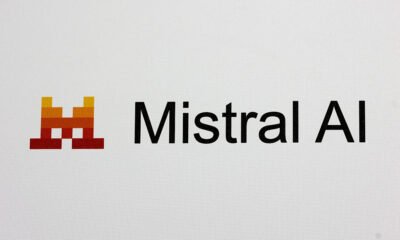Mistral AI, the French company that develops the AI chatbot Le Chat and several foundational large language models, is considered one of France’s most promising tech startups and is arguably the only European company that could compete with OpenAI.
“Go and download Le Chat, which is made by Mistral, rather than ChatGPT by OpenAI — or something else,” French president Emmanuel Macron said in a TV interview ahead of the AI Action Summit in Paris in February 2025.
In a significant step up from its June 2024 valuation of $6 billion, Mistral is now valued at €11.7 billion (approximately $13.8 billion) following a Series C funding round led by Dutch semiconductor company ASML, which invested €1.3 billion (approximately $1.5 billion) in September, alongside signing a new strategic partnership with the AI company.
ASML’s interest in having its clients benefit from its collaboration is an important milestone for Mistral. While the French company describes itself as “the world’s greenest and leading independent AI lab,” it is still not as well known as its biggest competitors.
What is Mistral AI?
Mistral AI, which offers some open source AI models, has raised significant funding since its creation in 2023, with the ambition to “put frontier AI in the hands of everyone.” While this isn’t a direct jab at OpenAI, the slogan is meant to highlight the company’s openness versus OpenAI’s more recent, closed source take at developing AI models.
Mistral’s chatbot Le Chat is available on iOS and Android, reaching 1 million downloads in the two weeks following its mobile release and grabbing France’s top spot for free downloads on the iOS App Store.
In July 2025, Mistral AI updated Le Chat with new features that bring it closer to rival full-stack AI chatbots: a new “deep research” mode, native multilingual reasoning, and advanced image editing. This update also added Projects, which lets users group chats, documents, and ideas into focused spaces.
Techcrunch event
San Francisco
|
October 27-29, 2025
As of September 2025, Le Chat can remember previous conversations thanks to a feature called Memories.
This is in addition to Mistral AI’s suite of models:
- Mistral Large 2, the primary large language model replacing Mistral Large.
- Pixtral Large, unveiled in 2024 as a new addition to the Pixtral family of multimodal models.
- Magistral, its first family of reasoning models, launched in June 2025.
- Mistral Medium 3, released in May 2025 with the promise of providing efficiency without compromising performance, meant for coding and STEM tasks.
- Voxtral, Mistral’s first open source AI audio model, released in July 2025.
- Devstral, an AI model designed for coding and openly available under the Apache 2.0 license, meaning it can be used commercially without restriction.
- Codestral, an earlier generative AI model for code whose license banned commercial applications.
- “Les Ministraux,” a family of models optimized for edge devices such as phones.
- Mistral Saba, focused on Arabic.
In March 2025, the company introduced Mistral OCR, an optical character-recognition API that can turn any PDF into a text file to make it easier for AI models to ingest.
In June 2025, Mistral AI also released a vibe-coding client, Mistral Code, to compete with Windsurf, Anysphere’s Cursor, and GitHub Copilot.
Who are Mistral AI’s founders?
Mistral AI’s three founders share a background in AI research at major U.S. tech companies that have operations in Paris. Its CEO Arthur Mensch used to work at Google’s DeepMind; CTO Timothée Lacroix and chief scientist officer Guillaume Lample are former Meta staffers.
Mistral’s co-founding advisers include Jean-Charles Samuelian-Werve (also a board member) and Charles Gorintin from health insurance startup Alan. Former digital minister Cédric O is also an adviser to the company, a fact that has caused persistent controversy due to his previous role.
Are Mistral’s models open source?
Not all of them. Mistral differentiates its premier models, whose weights are not available for commercial purposes, from its free models, for which it provides weights under the Apache 2.0 license.
Free models include research models such as Mistral NeMo, built in collaboration with Nvidia which the startup open sourced in July 2024.
How does Mistral make money?
While many of Mistral AI’s offerings are free or now have free tiers, Le Chat also has paid tiers. Introduced in February 2025, Le Chat’s Pro subscription costs $14.99 a month.
On the B2B front, Mistral AI monetizes its premier models through APIs with usage-based pricing. Enterprises can also license these models, and the company likely also generates a significant share of its revenue from its strategic partnerships, some of which it highlighted during the Paris AI Summit.
Overall, however, Mistral AI’s revenue is reportedly in the eight-digit range, according to multiple sources.
What partnerships has Mistral AI closed?
In 2024, Mistral AI signed a deal with Microsoft that included a €15 million investment and a strategic partnership for distributing the French company’s AI models through Microsoft’s Azure platform.
The U.K.’s Competition and Markets Authority (CMA) swiftly concluded that the deal didn’t qualify for investigation due to its small size, though the deal sparked some criticism in the EU.
In January 2025, Mistral signed a deal with press agency Agence France-Presse (AFP) to let Le Chat query the AFP’s entire text archive dating back to 1983.
Mistral AI also secured strategic partnerships with France’s army and job agency, Luxembourg, shipping giant CMA, German defense tech startup Helsing, IBM, Orange, and Stellantis.
In May 2025, Mistral said it would participate in the creation of an AI Campus in the Paris region, as part of a joint venture with UAE-investment firm MGX, NVIDIA, and France’s state-owned investment bank Bpifrance.
In June 2025, Mistral said it would launch a European platform dedicated to AI and powered by Nvidia processors, Mistral Compute, in 2026. The initiative was hailed as “historic” by Macron, who shared the stage with Mensch and Nvidia CEO Jensen Huang at the VivaTech conference shortly after the announcement.
In July 2025, Mistral launched AI for Citizens, an initiative that the company claimed could “help States and public institutions strategically harness AI for their people by transforming public services.”
In September 2025, Mistral and chip company ASML struck a partnership “to explore the use of AI models across ASML’s product portfolio as well as research, development and operations.”
What enterprise features has Mistral AI developed?
In May 2025, Mistral AI released the Mistral Agents API to “empower enterprises to use AI in more practical and impactful ways,” according to its Head of Developer Relations, Sophia Yang.
In September 2025, the company unveiled a revamped Connectors directory, showcasing Le Chat’s integrations with some 20 enterprise tools, including Asana, Atlassian, Box, Google Drive, Notion, and Zapier, as well as emails and calendars; and soon, Databricks and Snowflake.
How much funding has Mistral AI raised to date?
By February 2025, Mistral AI had raised a total of around €1 billion, some of which was debt financing. The money was raised across several equity rounds conducted in close succession.
In June 2023, just one month after being founded, Mistral AI raised a record $113 million seed round led by Lightspeed Venture Partners. Sources at the time said the seed round, Europe’s largest ever, valued the startup at $260 million.
Other investors in that round included Bpifrance, Eric Schmidt, Exor Ventures, First Minute Capital, Headline, JCDecaux Holding, La Famiglia, LocalGlobe, Motier Ventures, Rodolphe Saadé, Sofina, and Xavier Niel.
Six months later, Mistral closed a €385 million Series A ($415 million at the time), at a reported valuation of $2 billion. The round was led by Andreessen Horowitz and saw participation from Lightspeed, as well as BNP Paribas, CMA-CGM, Conviction, Elad Gil, General Catalyst, and Salesforce.
Microsoft’s $16.3 million convertible investment in Mistral as part of a partnership announced in February 2024 was presented as a Series A extension, implying an unchanged valuation.
In June 2024, Mistral raised €600 million (about $640 million) in a mix of equity and debt. The long-rumored round was led by General Catalyst at a $6 billion valuation, with notable investors including Cisco, IBM, Nvidia, and Samsung Venture Investment Corporation participating.
Earlier this year, Mistral AI was rumored to be finalizing a €2 billion investment at a post-money valuation of $14 billion. This followed earlier reports that the company was in talks to raise $1 billion in equity from investors, who included Abu Dhabi’s MGX fund, as well as hundreds of millions of euros in debt.
On September 9, 2025, Mistral closed a €1.7 billion (about $2 billion) Series C round led by ASML at a €11.7 billion (approximately $13.8 billion) valuation. According to the company, the round saw investments from existing backers DST Global, Andreessen Horowitz, Bpifrance, General Catalyst, Index Ventures, Lightspeed, and NVIDIA.
How is Mistral AI approaching AI regulation?
Mensch was part of a group of European CEOs who signed an open letter in July 2025 urging Brussels to “stop the clock” for two years before key obligations of the EU Artificial Intelligence Act enter into force. The European Commission is sticking to its original timeline.
What could a Mistral AI exit look like?
Mistral is “not for sale,” Mensch said in January 2025 at the World Economic Forum in Davos. “Of course, [an IPO is] the plan.”
This makes sense, given how much the startup has raised so far: Even a large sale may not provide high enough multiples for its investors, not to mention sovereignty concerns depending on the acquirer.
However, the only way to definitely squash persistent acquisition rumors — lately naming Apple — is to scale its revenue to levels that could even remotely justify its valuation. Either way, stay tuned.
This story was originally published on February 28, 2025, and will be regularly updated.









































